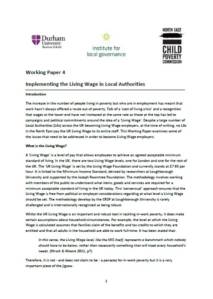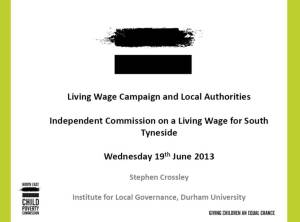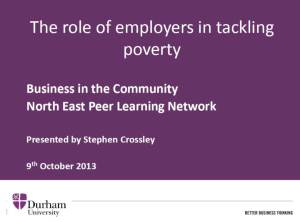Why Paying a Living Wage Makes Business Sense
Guest post by David Van der Velde, Managing Director of Web Development Company, Consult and Design International.
Consult and Design recently joined hundreds of other employers in pledging to pay a living wage to all our staff, see www.livingwage.org.uk/employers. In this blog post, I will clarify why this is a positive move for our business, for our staff, for our clients and for society at large. I will explain why I am advising businesses to join us and other living wage employers such as PWC, Amnesty, NCVO and KPMG as well as my thoughts on what the living wage (or an increase in the minimum wage) means for how we think about our staff and where government should be targeting public policy.
So what are our reasons for becoming a Living Wage employer?
Consult and Design is a knowledge-based business, investing heavily in the skills of our workforce. We know the value of bringing good people into the business, giving them the proper financial support and training in order that they can contribute to the success of the business, not just by doing their job adequately but also by staying committed to the on-going success of the business. When staff are treated well they put their whole self into the job. By treating our staff well, we attract talented and creative people who are constantly finding new ways to improve what we do and the way do it.
Staff who feel valued and respected are more likely to go the extra mile to provide a good service to our clients and make sure that the work they produce is of the highest quality.
The alternative to looking after our staff in this way would be increased staff turnover (with associated recruitment and training costs), more sick leave, reduced productivity for us and a lower quality of work for our clients. This really isn’t an alternative. (See 1. “The Business Case for the Living Wage”)
What about unskilled workers?
All this is easy enough to say for a highly skilled, knowledge based business, but there is an argument that a higher minimum wage or ‘Living Wage’ will force some businesses to shed unskilled jobs in order to accommodate the increase in costs, or alternatively pass higher costs on to their customers.
Will consumer prices rise?
In terms of higher costs to the consumer, if paying the living wage was accepted as the norm, then without any government intervention the tendency would be for this to increase the costs of production and therefore the price paid by the customer. Studies have found however (2), that much if not all of this loss can be offset by reductions in staff turnover and the associated recruitment and training costs. As stated above, the improved staff loyalty that results from paying a living wage results in greater productivity (again offsetting costs) and better quality of work (meaning better quality for the customer.) With this in mind cost increases are likely to be marginal and customers will see a rise in the quality of the goods/services they purchase, resulting in better overall value.
Will unemployment increase?
Before the minimum wage was introduced in the UK in April 1999, it was opposed by business lobbies and some on the political right, with David Cameron quoted in the Stafford Chronicle, 21 February 1996 saying ‘Labour’s plans for minimum wages, would send unemployment straight back up.’ This has not been borne out by data (3) – empirical work on the impact of the introduction of the minimum wage suggests that ‘while it may have had an adverse effect on employment in particular sectors, the overall effect on employment has been broadly neutral.’
How should businesses change the way they work to meet the living wage standard?
In short, if businesses are given enough time to plan for the change then smart businesses will recognise the need to change the way that jobs are organised so that the value their staff contribute can make paying the living wage viable.
In some sectors, for smaller businesses and in certain contexts it may be necessary for public policy to offer financial support and incentives to counteract any increased burden on employers, which could stifle enterprise and growth.
This is less of a problem for the knowledge based businesses, where investment in staff is the norm and retention of trained staff a priority. For businesses employing a large proportion of unskilled, minimum wage staff the culture change needs to be a bit more radical.
Moving from a ‘function-centric’ to a ‘person-centric’ employment model
We need to move away from the ‘function-centric’ model where a business owner asks a question like – “what’s the cheapest way I can keep the floor clean?” to a “person-centric” model where the question is framed as “how can I get the best value out of employing Mary?”
Once the question is framed in this way the business becomes more interested in the employee as a whole person, with all the potential they bring. This increases the likelihood of the organisation wanting to invest in Mary’s training and future productivity.
The social impact of low pay
The final argument for paying a living wage lies in the impact this has on the communities in which we live, work and do business.
At Consult and Design we work with a lot of voluntary sector organisations some of whom support disadvantaged children, families and communities. The Joseph Rowntree Foundation’s report (4) on ‘The Role of the low pay, no pay cycle in recurrent poverty’ shows that low pay and the associated job insecurity has a significant detrimental impact on health, child poverty and debt in communities.
So should government act and how?
These days, everyone would agree that it makes sense for governments to intervene to prevent business from polluting the environment because of the negative impact on communities and the cost to the public sector of cleaning up. In the same way it makes sense for public policy to take account of the effect in communities of low pay and the cost of dealing with the resultant social problems further down the line.
By increasing the statutory minimum wage to a living wage level, the public sector will make long term savings, which far outweigh the potential costs incurred by businesses.
That said, at Consult and Design our experience of recruiting staff has meant investing heavily in their skills, putting in time to train staff and pay their wages while they learn. We have benefitted from subsidies to recruit young people, which have offset some of these costs and enabled us to create permanent well-paid jobs for the young people we recruit.
If we can recognise the benefit to the public purse of creating well paid jobs and training staff, then there ought to be a mechanism for supporting and rewarding this activity.
I would like to see a system where small to medium enterprises (SME’s) could employ new staff at a lower rate whilst they are in training, with the difference in pay being made up by the government. The success of businesses in creating permanent posts from these subsidised contracts should be recorded to prevent abuse of the system, to reward the business that are successful employers and to inform minimum wage job seekers about those firms where they have the best opportunities to progress.
1. The Business Case for the Living Wage
https://www.google.co.uk/url?sa=t&rct=j&q=&esrc=s&source=web&cd=4&ved=0CFEQFjAD&url=http%3A%2F%2Fwww.unisoneastern.org.uk%2Fassets%2Fdownload%2F841&ei=j8tSUqyqBKrK0QWn8oGoAQ&usg=AFQjCNGrCQQvU4x3xcY1ZpAXyM89jiN0OA&sig2=ubgrrMY33oLA55A30-1lQg
2. Employers’ Role in the Low Pay, No Pay Cycle
http://www.jrf.org.uk/publications/employers-role-low-pay-no-pay
3. “The Employment Effects of the National Minimum Wage”,
Economic Journal, 114, C110-116. Stewart, Mark B. (2004b)
4. ‘The Role of the low pay, no pay cycle in recurrent poverty’
http://www.jrf.org.uk/publications/understanding-recurrent-poverty
David Van der Velde, Managing Director of Web Development Company, Consult and Design International.
www.consultanddesign.com












Family Support and Child Poverty
Steve Crossley, freshly released from the burden of responsibility for this blog, has penned a readable report on the role of Family Support in addressing Child Poverty: ‘Family support’ and child poverty.
Based on a review of available evaluation evidence, Steve concludes that family support projects, while important for helping families, are NOT a way of tackling child poverty, because while they tackle some issues caused or exacerbated by poverty, but do not tackle the causes of that poverty. He points out that the scale of resources invested in supporting families is dwarfed by the resources that are being taken away from families through welfare reform, cuts to public services and falling real wages.
Share this:
Leave a comment | posted in child poverty, comment, in-work poverty, Troubled families